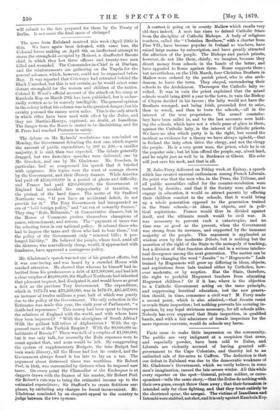Mr. Gladstone's speech was not one of his greatest efforts,
but it was convincing, and was heard by a crowded House with marked attention. He showed that whereas he himself had in- herited from his predecessors a debt of £13,300,000, and had left a clear surplus of £6,000,000, Sir Stafford Northcote had inherited that pleasant bequest, had dissipated it, and would leave as great a debt as the previous Tory Government. The expenditure, which in 1873-74 was £73,269,000, was in 1878-79, £85,407,000, an increase of twelve millions a year, half of which was purely due to the policy of the Government. The only reduction in the Estimates was made this year, the sixth year of Parliament, "a death-bed repentance." This money had been spent to improve the relations of England with the world, and with whom have they been improved P " With the aborigines of South Africa P With the gallant hill tribes of Afghanistan ? With the op- pressed races of the Turkish Empire P With the 80,000,000 in- habitants of Russia ?" There was_talk of a surplus of £1,900,000, but it was only talk, for avowedly the Zulu expenses were to count against that, and none would be left. By exaggerating the system of supplementary Budgets, the true Budget had been made illusory, till the House had lost its control, and the Government always found it too late to lay on a tax. The argument about distressed times was worthless. Sir Robert Peel, in 1842, was surrounded by distress when he imposed new taxes. On every point the Chancellor of the Exchequer is at daggers drawn with the finance of his master, Sir Robert Peel. Sir Robert's rule was to bring the estimated income up to the estimated expenditure ; Sir Stafford's to create fictitious sur- pluses, by excluding any charges he found inconvenient. Mr.
judge concluded by an eloquent appeal to the country to Judge between the two systems.


































 Previous page
Previous page